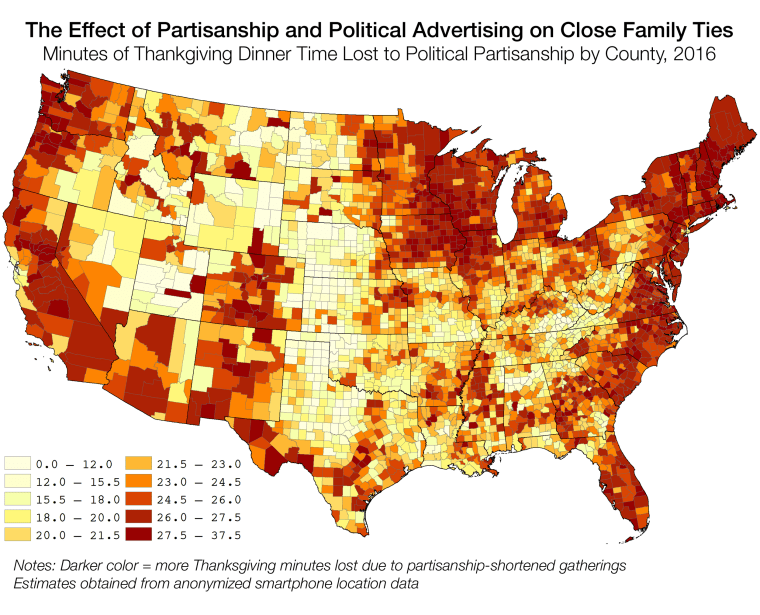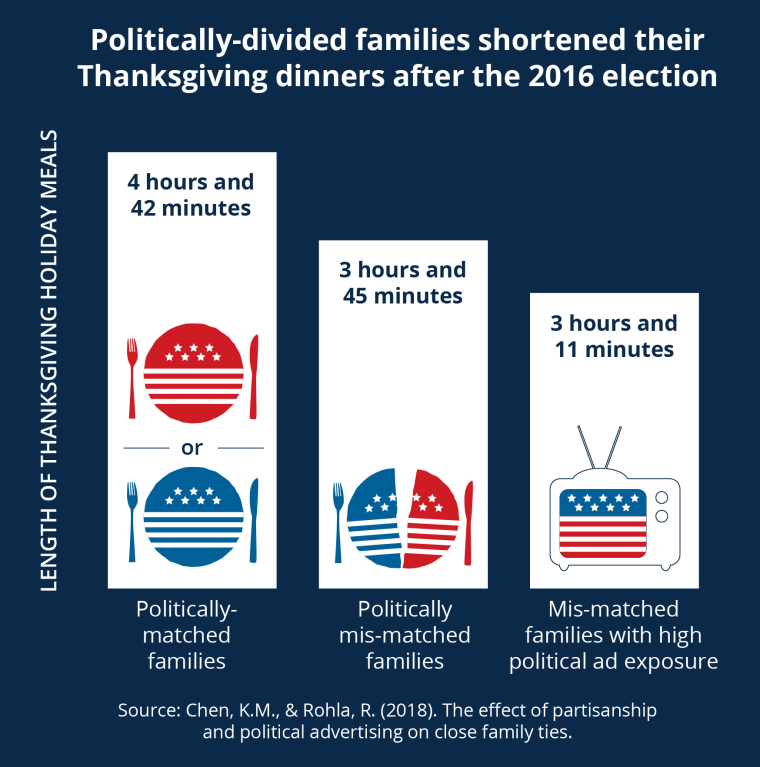If you have been dreading family holidays lately, you are not alone. And now science backs up what millions of Americans already know: that the election of Donald Trump as president in 2016 has divided us.
A pair of economists has used cellphone tracking data to show that Thanksgiving dinners were significantly shorter in 2016 than in the year before.
Not only did people cut short their Thanksgiving visits if they crossed a political divide, but more people skipped family visits altogether, economics professor Keith Chen of the University of California Los Angeles and Ryne Rohla of Washington State University found.
“The election season was a real gut punch. The outcome was really unexpected,” Chen said.

It’s no surprise to learn that political rifts have deepened across the U.S. and Chen says voting data shows that.
“Go back 30 years and almost no counties in the United States swung by more than 20 percent in a U.S. election,” Chen said. Now, it’s common to see counties that are overwhelmingly Republican or Democratic, with a 75-25 split or greater, he said.
That means neighbors and even work colleagues often agree with one another politically. “No one who sends their kids to the same school, no one who you meet at work, is from a different political party,” Chen said.
But, as the saying goes, you can’t choose your family.
Chen and Rohla worked with a company called SafeGraph, which tracks smart phone location data, aggregates and anonymizes it, and then analyzes it.
“Our primary analysis includes 21 billion pings from November 2016 and 4.5 billion from November 2015,” they wrote in the journal Science. It covered more than 10 million Americans.
They could use location to determine where a person lives and to infer from that who they would have supported in the 2016 election. They could also use it to see if they traveled from that location for Thanksgiving and if they did, whether they went into opposition political territory.

And they could measure how long they stayed there.
“This sample is representative of the 77 percent of Americans who own smartphones,” they wrote.
On average, people who went from Democratic-leaning voting precincts to Republican areas in 2016 shortened their visits by between 20 and 40 minutes compared to blue-county residents who visited other blue-state residents, the researchers found. Republicans shortened their visits to Democratic hosts by about 50 to 70 minutes.
And, often, people who spent Thanksgiving together in the same place in 2015 didn’t in 2016.
“Overwhelmingly yes — they didn’t get together at all. If they voted for different candidates, they skipped Thanksgiving day altogether,” Chen said.
This means that people are losing even more opportunities to understand why people with opposing views think the way they do. Americans are already tailoring their media and social media consumption based on political preferences. Now they’re spending even less time trying to understand why their cousin voted the way he did.
“It’s really dispiriting. It’s really depressing,” Chen said.
'Decline in the social fabric'
To make sure the effect was political and not something else, they looked at the effects of advertising.
“If you lived in Orlando, over 20,000 political ads were run on your television stations during the 2016 campaign,” Chen said. “For every 1,000 ads that played in your area, problematic Thanksgiving-day dinners shorted by almost three minutes. It really magnified things.”
Chen declined to discuss his own family politics, but said he hoped that demonstrating the deepening divisions will help people make changes.
“What we are hoping is that American families find a way to adapt,” he said.
The Pew Research Center found that, at the end of 2016, 39 percent of U.S. adults were trying to avoid family conversations about politics.
"Some people don't see losing dinner with relatives as a particularly large cost," said Rohla. "I've talked to people who are, 'Well, so what?' Personally I think it is concerning. To me it's a symptom of a broader decline in the social fabric of the United States."
